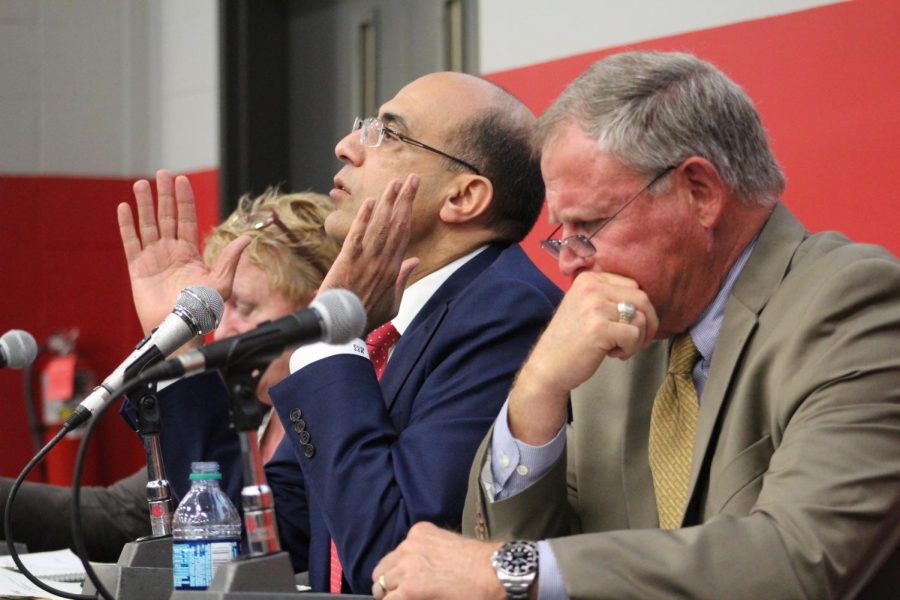Panelists address concerns regarding RAMP budget model
May 31, 2018
Three panelists from public universities in North Dakota, Indiana and northern Kentucky, held a panel discussion to address issues regarding the new budget model for the resource allocation, management, and planning (RAMP) initiative Thursday afternoon.
The panelists included Northern Kentucky University (NKU) Provost Sue Ott Rowlands, University of North Dakota (UND) Dean of College of Engineering and Mines Hesham El-Rewini and Indiana University (IU) Associate Vice Chancellor for Budgetary Administration Doug Priest.
Rowlands, El-Rewini and Priest were chosen by WKU and Huron Consulting Group to discuss the budget models that their universities are currently using, which are described as being more decentralized and incentive-based, according to the webpage on the RAMP initiative.
The RAMP budget model is a proposed model for WKU for the 19-20 fiscal year. President Timothy Caboni announced the initiative for the new model on January 4, 2018, in an email sent to all faculty and staff.
The model will run concurrent to the university’s current budget model for the 18-19 fiscal year, which is referred to as a “shadow year.” When that fiscal year ends, the university may choose to continue or end the proposed model, according to the panelists and Andrew Laws from Huron, who moderated the forum.
Provost David Lee, who introduced Laws and the panelists, said WKU has partnered with Huron to create the new model for WKU. Lee said the WKU steering committee was tasked with working on the model. The committee is comprised of 14 members and Lee is one of two of its co-chairs.
Huron has helped about 45 other universities change their budget models, Lee said.
“The success of this whole initiative is dependent on the feedback from a whole variety of stakeholders, and that’s to make sure that this new model really does fit with our strengths, our culture, our values and the strategic priorities for this institution,” Lee said.
The panelists answered questions by multiple faculty and staff members during the forum.
Kirk Atkinson, an associate professor in the Gordon Ford College of Business, asked the panelists how the new budget model would be applicable to WKU.
In the 17-18 fiscal year, WKU received $74.6 million in state appropriations, which equaled about 18 percent of the university’s operating budget. State appropriations to NKU made up 33 percent of its operating budget and UND made up 57 percent, according to information provided by the panel.
Atkinson asked if the reductions created competition between the colleges and “created an unhealthy environment” at the panelists’ individual universities.
“It can generate competition, but it can also generate cooperation,” Rowlands said, in response to Atkinson’s question.
El-Rewini said Atkinson’s concerns are valid.
“You do what you can do to prevent that from happening,” El-Rewini said. “In my humble opinion, the benefits outweigh the risks.”
NKU began using the budget model in 2017.
“The model doesn’t do anything,” Rowlands said, regarding the impact of the model. “It’s a tool that we use.”
Kristin Wilson, associate professor in the education leadership doctorate program, expressed her concern with creating the new budget model.
“From my viewpoint, there’s been no transparency and no collaboration so my overarching question is when is that going to start?” Wilson said. “When are we going to have the real conversations?” Her question received a clap from one attendee.
Wilson said she has only received several emails from Caboni, which are addressed to all faculty and staff, about the upcoming budget model, but she had not received word about the model and the decisions behind it. She also asked the panelists about the formulas for Division of Extended Learning and Outreach (DELO) moving forward.
“The formulas for DELO haven’t been decided yet,” Laws said, also saying that creating the budget will be at least an 18-month process. “Nothing formal is going to go live until 2020.”
Lee said he was pleased to see the active debate taking place with the panelists and the members of faculty and staff.
“I think it reflects a healthy time on campus,” Lee said. “I think we’re going to be in a really good place going forward.”
Senior Vice President for Finance and Administration Ann Mead later wrote in an email that there could be modifications to the model during 2018-2019.
“We will be looking for any unintended negative consequences during the first year before fully implementing in 2019-20,” Mead wrote. “Based on our assessment since January, we will go with the budget model adapted to WKU.”
Nicole Ziege can be reached at 270-745-6011 and nicole.ziege825@topper.wku.edu. Follow Nicole Ziege on Twitter at @NicoleZiege.














